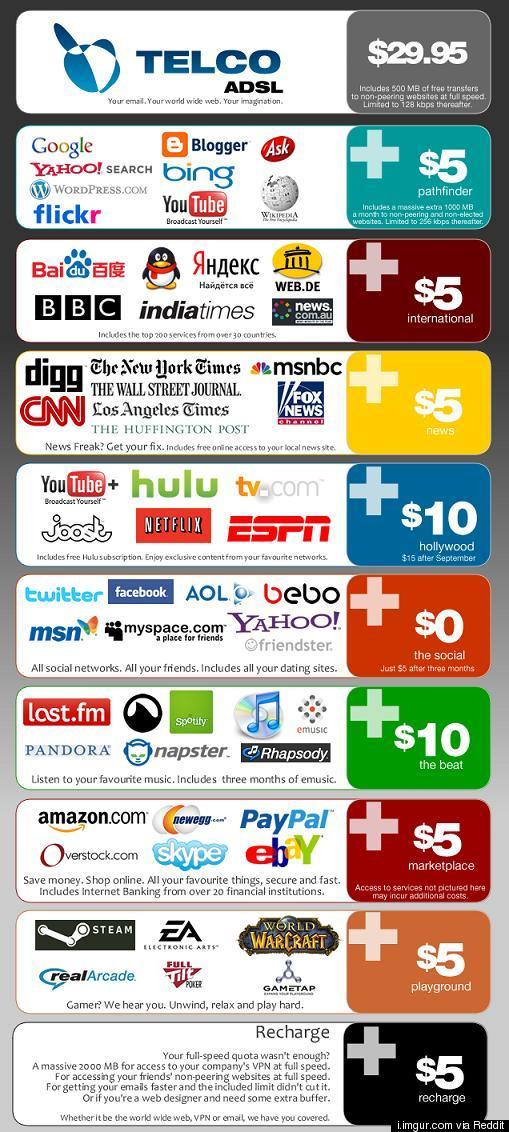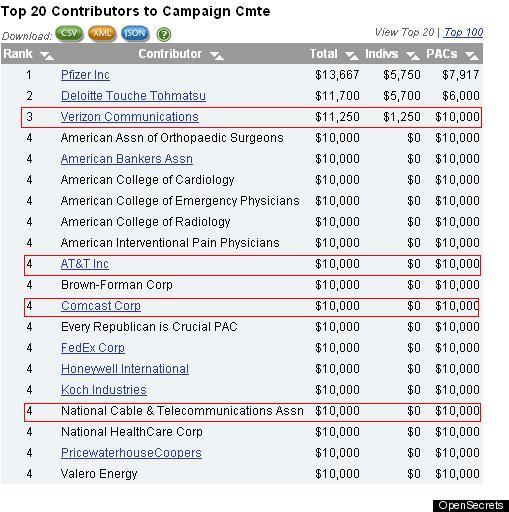
I have to admit, when I saw this headline, "Will Marsha Blackburn be GOP's next tech policy champion?" in Politico, there was a brief, mad moment where I imagined I was about to read about how Rep. Blackburn (R-Tenn.) was poised to step up as a "champion" to the community of tech innovators, and lead on crafting policy that would be beneficial to them. I needn't have worried! As it turns out, the piece would have been more aptly titled: "Marsha Blackburn unilaterally backs the interests of giant telecom conglomerates."
On the opening day of the 112th Congress, the Tennessee Republican reintroduced a bill to bar the Federal Communications Commission from instituting net neutrality rules. Days later, she spoke on an online privacy panel at the geek equivalent of the Oscars: the International Consumer Electronics Show. Last week, she keynoted the State of the Net conference -- the biggest tech policy fete in the capital so far this year.
The first sign was the first sentence of the above paragraph. What the FCC has on offer, as far as net neutrality goes, was considered by those concerned for the future of the public internet to be "toothless" and "riddled with loopholes" -- well worth reconsidering. But if Blackburn has her way, the current FCC rules are about as good as it's going to get.
Blackburn's opposition to net neutrality -- she calls it "the Fairness Doctrine for the Internet" -- dates back to 2006, when Rep. Ed Markey (D-Mass.) introduced a bill to keep the Internet open. She said the content community in Nashville feared the federal government would control Internet traffic, and it wanted to deal directly with service providers.
The invocation of the "Fairness Doctrine" is a neat trick. Conservatives have long lived in fear that the "Fairness Doctrine" -- an abandoned policy that sought to regulate political content on the radio to ensure that "equal time" be given to both sides of a political debate -- would be re-enacted. In fact, the current FCC Chair, Julius Genachowski is against its reimplementation. But calling it to mind helps to spark fears that the government will impose some sort of heavy-handed regulation for online speech.
Part of the problem here is that to read this Politico article is to be left with the impression that "net neutrality" would be a bad thing. But, in a plain English that Politico didn't see fit to provide, what "net neutrality" prevents is a tiered internet -- where different content comes to your computer at different speeds or at different prices. Big telecoms would like the option to build themselves a fast lane on the "internet superhighway," where their content gets preferential delivery depending on how much you're willing to pay for it. If you want a vision of the future in which net neutrality is nonexistent, here's a glimpse, courtesy of a Reddit user:

And while that's a swamp of discontent for everyone who currently enjoys the status quo online, it's an especially bad deal for innovators and startups. Denied the preferential treatment, they're placed at a competitive disadvantage to everyone who has bought access to the fast lane. Whether you are cognizant of it on a daily basis or not, the freedom you enjoy to travel the web and sample a variety of content on an equally available basis comes because of some core values that have long been in place. And an end to net neutrality upturns those core values.
Politico seems largely fascinated by the fact that it's a Congresswoman from Tennessee that's taken a firm hand in crafting tech policy.
Blackburn's turf, however, is far from the tech hubs of Silicon Valley, New York's Silicon Alley or Boston's Route 128 corridor. She's from Brentwood, Tenn., a suburb of Nashville, known more for producing country music than silicon chips or Web startups.
I guess you're meant to be fascinated by that! Wow! How did it happen that Blackburn got so interested in the internet, instead of the Country Music Awards, or something?
The answer to that is incredibly prosaic. Blackburn is a member of the House of Representatives. Her existence there is underwritten by any number of corporate donors. Those corporate donors instruct her as to how she is supposed to think about things. And how she's supposed to think about things is "any way in which the corporate interests who have bought her want her to think."
OpenSecrets has the data on Blackburn's contributors that will not, in the very least, surprise you:

"The tech community has taken notice," says Politico. But if they had actually contacted someone from the tech community, instead of just talking to someone at the very-much-not-a-member-of-the-tech-community Brookings Institution, I might not have had to explain how all of this really works.
[with contributions from Bianca Bosker]
PREVIOUSLY, on the HUFFINGTON POST:
Al Franken: The Internet as We Know it Is Still at Risk
[Would you like to follow me on Twitter? Because why not? Also, please send tips to tv@huffingtonpost.com -- learn more about our media monitoring project here.]
